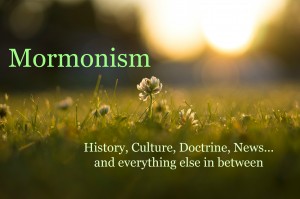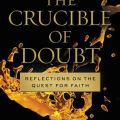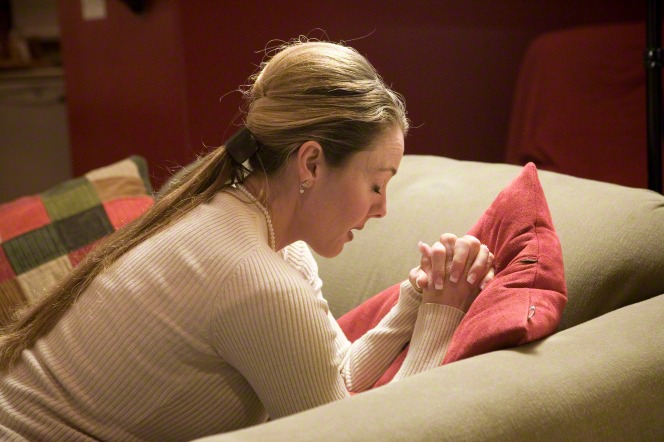I recently received a review copy of The Crucible of Doubt: Reflections on Our Quest for Faith. This unique book was given to me in exchange for an honest review.
Who the Book is for
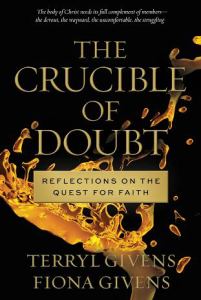 The authors, Terryl Givens and Fiona Givens, have scholarly backgrounds. Brother Givens works as a professor of literature and religion at the University of Richmond and his wife, Fiona Givens, is a retired instructor of modern languages. This academic background shows clearly in the book, which often draws on poetry, mythology, and classical literature to make points throughout the book. The style was unexpectedly philosophical and literary, which took me a little time to settle into only because I was not expecting it. It is a unique approach to the subject of coping with a crisis or challenge in faith.
The authors, Terryl Givens and Fiona Givens, have scholarly backgrounds. Brother Givens works as a professor of literature and religion at the University of Richmond and his wife, Fiona Givens, is a retired instructor of modern languages. This academic background shows clearly in the book, which often draws on poetry, mythology, and classical literature to make points throughout the book. The style was unexpectedly philosophical and literary, which took me a little time to settle into only because I was not expecting it. It is a unique approach to the subject of coping with a crisis or challenge in faith.
I suspect the book will appeal to a somewhat limited audience, but it is an audience that lacks a book, and so it fills a critical role. I spend a fair amount of time in online places where Latter-day Saints and those who don’t like them gather together. The debates on our faith are often intense and very intellectual in nature, with many having a firm academic background in issues related to faith. Some of those struggling with the issues that are brought up are members of the Church who are deciding whether or not to stay. It is this intellectual group that has unique challenges when their faith is uncertain and few books aim for this complicated audience.
Who the Book is Not for
 Those who pick up the book to help a friend or family member and are not involved in apologetics may be a bit unnerved by discussions of negative concepts—issues that show the Church is not perfect (but the doctrines are) and neither are its leaders, issues that are controversial, and even admissions that there are clusters of Mormons, particularly in the Mormon corridor, who are somewhat arrogant about their faith. This last group was addressed in the October 2014 General Conference. However, rest assured that the person they are worried about has already heard all these things. There was only one discussion I had not directly heard before in the entire book. These topics are largely debated and agonized over throughout the Internet and many books. Even the Church itself is now addressing those issues, talking about extremely controversial events in Church history that either weren’t our best moments or that are seen as bad things by others who don’t understand. We can no longer live in a fantasy world that pretends none of those things happened or are discussed. We can’t pretend we can ignore them and still win these people back into the gospel. I do think it might be a good idea for the promotional materials to be a little more clear on the intended audience, since I am aware that some readers were uneasy about the content. It is not really suitable for those people and the background material should make it clear that apologetics are part of the discussion.
Those who pick up the book to help a friend or family member and are not involved in apologetics may be a bit unnerved by discussions of negative concepts—issues that show the Church is not perfect (but the doctrines are) and neither are its leaders, issues that are controversial, and even admissions that there are clusters of Mormons, particularly in the Mormon corridor, who are somewhat arrogant about their faith. This last group was addressed in the October 2014 General Conference. However, rest assured that the person they are worried about has already heard all these things. There was only one discussion I had not directly heard before in the entire book. These topics are largely debated and agonized over throughout the Internet and many books. Even the Church itself is now addressing those issues, talking about extremely controversial events in Church history that either weren’t our best moments or that are seen as bad things by others who don’t understand. We can no longer live in a fantasy world that pretends none of those things happened or are discussed. We can’t pretend we can ignore them and still win these people back into the gospel. I do think it might be a good idea for the promotional materials to be a little more clear on the intended audience, since I am aware that some readers were uneasy about the content. It is not really suitable for those people and the background material should make it clear that apologetics are part of the discussion.
Combining Faith and Intellect
This is the book I needed as an investigator, and, if my faith began to waiver, it is the book I would need today. As a teen raised in a highly intellectual home, I struggled to understand how to make faith and intellect work together. When I learned uncomfortable things about church history, I wasn’t sure how to approach them. I understood that people aren’t perfect and history includes the mistakes of many valiant people—I have always been a history buff—but I didn’t quite know how to make all that fit into my new spiritual life. This book addresses those concerns and it copes with everything that made me afraid to join.
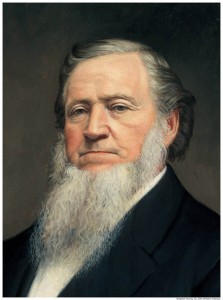 One of the most helpful portions to me, but one that seems to worry the most people, is the acknowledgement that prophets are not perfect and that we must not hero-worship them. This, for many, is what causes people to fall away. They somehow get it into their minds that prophets must be perfect at every moment and that they are not allowed to have or express personal opinions. This is something I am constantly having to correct for former Mormons and to non-Mormons, who assume that any religious thought a prophet has is automatically doctrine, even if it contradicts what is taught today and was never canonized. Modern church leaders have addressed this often.
One of the most helpful portions to me, but one that seems to worry the most people, is the acknowledgement that prophets are not perfect and that we must not hero-worship them. This, for many, is what causes people to fall away. They somehow get it into their minds that prophets must be perfect at every moment and that they are not allowed to have or express personal opinions. This is something I am constantly having to correct for former Mormons and to non-Mormons, who assume that any religious thought a prophet has is automatically doctrine, even if it contradicts what is taught today and was never canonized. Modern church leaders have addressed this often.
However, there are patterns to be followed in learning how to tell the difference between an opinion and a revelation or a canonized doctrine. This requires work on our part, but when has God ever allowed the gospel to be a passive part of our lives? The book carefully outlines how to go about doing this. The prophets themselves have addressed this issue, so I don’t find it inappropriate to bring up.
The authors take a Christian approach to the problem that is rare. They do not criticize the reader for knowing about our less-than-perfect Mormon moments or for worrying about them. Their concerns are acknowledged. Sometimes they are shown the background information they probably didn’t learn from anti-Mormon books that they need to know in order to identify lies or to better understand the issues. Sometimes they are encouraged to be patient and understanding towards imperfect Mormons. Sometimes, they are reminded that there are great benefits to attending church, even when your faith is shaky. Associating with people of faith can be comforting and supportive, allowing you time to build on the testimony you once had. They are also shown how to differentiate between the opinions of a church leader, and the actual doctrines, as well as how to better accept that even prophets aren’t perfect—that role is reserved for Jesus Christ. Imperfection in either a church or a person has nothing to do with the truthfulness of the gospel or the Church.
The book addresses many issues often missing in books written for those who struggle intellectually. Strictly apologetic approaches often focus only on the intellect, while leaving out issues of pure faith. Faith-oriented approaches sometimes ignore the factual (or popular, but non-factual) teachings that cause faith lapses. This book takes both in hand at once.
Some of my favorite messages from the book are:
- The scriptures sometimes contradict each other, it seems, but this only requires us to let go of deeply held, and often wrong understandings to find the truth and unity.
- Sometimes we struggle because we are asking the wrong questions. Questions are good—but we need to learn what to ask in order to learn what we need to know.
- Science matters, but it is not the most important thing because it can’t tell us how to live meaningful lives from an eternal perspective.
- The point of true religion may not be to provide complete answers to every question.
- True doctrine isn’t always easy or pleasant.
- True religion is about giving gifts to God, not seeking them for ourselves.
- People aren’t perfect, even those called to callings. Consider their struggling efforts to be the widow’s mite.
- Obeying God when you don’t understand why God wants you to do something brings great joy.
- God delegates His authority to specific people and He really means they have His authority—even if they aren’t perfect. We need to honor that.
- We need to turn to God when we’re not sure it’s right.
- The Church teaches that Mormons are not the only people allowed to have truth—and that includes the times during the apostasy. We aren’t better than everyone else. What we have that is different is authority.
-
We are responsible for our own spiritual growth and should not complain if we don’t’ learn everything we need to know in three hours of church. We need to work on our own as well.
- It would be sad if the Bible told us every single thing we need to know and we never had to turn to God for more or if we didn’t have to learn to be patient as we wait for understanding.
- Don’t give up your own sacred well-being because someone else has been unkind to you. That only punishes you further.
- It’s okay to admit you have a shaky testimony. The best people will love you and help you.
What I loved most about this book is that it shows deep respect for the intellectuals in the Church and for the questions they ask. It shows them that their intellectual bent is wonderful, but can be enhanced by faith. It also teaches that no one promises it will be easy or fast—but it will be worth it, so keep coming to church even while you struggle to find your testimony.
The late Terrie Lynn Bittner—beloved wife, mother, grandmother, and friend—was the author of two homeschooling books and numerous articles, including several that appeared in Latter-day Saint magazines. She became a member of the Church at the age of 17 and began sharing her faith online in 1992.


